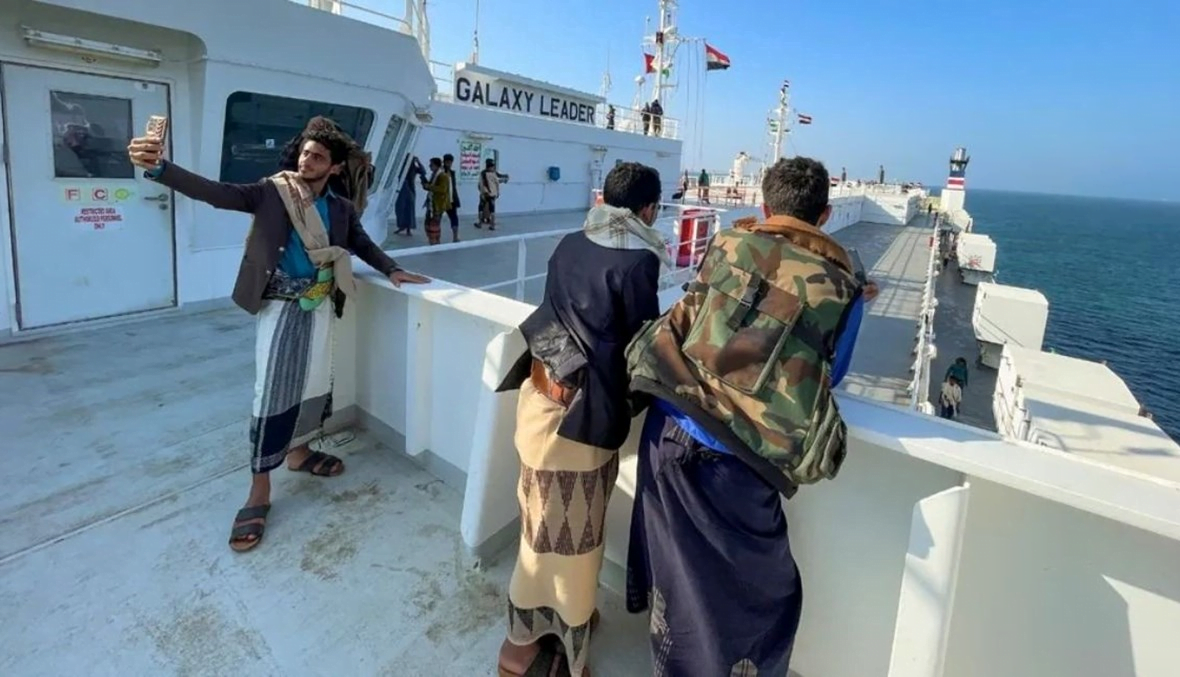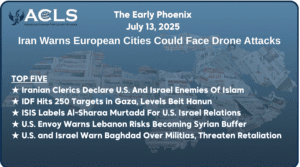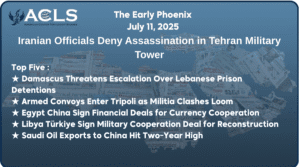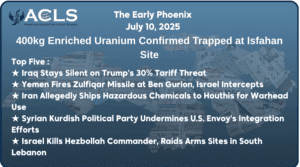The Drums of War: Pakistan Strikes Iranian Targets in Escalating Border Conflict
Top Headlines:
- Pakistan Strikes Iranian Targets in Escalating Border Conflict.
- Houthi Response to Terrorist Designation: Houthi Attacks and U.S. Retaliation.
- Collapse of Justice: Beirut Port Explosion’s Prime Suspect Freed from Investigation.
- Egypt Confronts Dual Challenges: Renaissance Dam Impact and Ethiopian-Somaliland Agreement.
- Turkiye Intensifies Military Campaign in Northeast Syria.
=======================
★ Iran

1.Pakistan Strikes Iranian Targets in Escalating Border Conflict. In a significant escalation of border tensions, Pakistan’s Ministry of Foreign Affairs confirmed today that its military conducted precision strikes against militant groups in Iran’s Sistan and Baluchestan province. This operation, termed ‘Marg Bar Sarmachar’ (Death to Insurgents), comes a day after the Iranian Revolutionary Guards launched missile and drone strikes inside Pakistani territory.
Pakistani officials stated the strikes were a direct response to Iran’s actions, which they deemed a blatant violation of their national sovereignty. Iranian state media reported civilian casualties, including women and children, raising concerns about the operation’s precision.
The conflict’s roots lie in both nations’ accusations of harboring militants. The recent attacks focus on the ‘Jaish al-Adl’ group, a Sunni militant organization considered a terrorist entity by both the United States and Iran.
This escalation comes amid a broader regional context of Iranian military activity, including recent strikes in Iraq and Syria. In a move reflecting deepening diplomatic rifts, Pakistan has recalled its ambassador from Iran and barred the Iranian ambassador from returning to Islamabad.
The situation is particularly volatile given the nuclear capabilities of both countries. Only days ago, Iran and Pakistan conducted joint naval exercises, indicating the complexity of their bilateral relationship. The recent conflict has raised concerns among international observers about the potential for a larger regional conflict.
From Iran’s perspective, Jaish al-Adl is viewed as a significant terrorist threat, particularly in the Sistan and Baluchestan Province. The group has been responsible for numerous attacks targeting Iranian security forces and infrastructure in this region. Iran has consistently accused Pakistan of either harboring Jaish al-Adl or failing to take adequate measures against them, asserting that they operate from Pakistani soil. Moreover, the challenging geography of the Iran-Pakistan border, which is both mountainous and porous, complicates Iran’s efforts to secure it. The presence of various armed groups in this terrain further exacerbates Iran’s border security challenges.
On the other side, Pakistan contends with its own set of challenges stemming from cross-border militancy. It has experienced attacks from groups based in or allegedly supported by Iran, including incursions into Pakistani territory that target both military and civilian entities in the Balochistan region. Pakistan’s approach involves a complex balancing act: addressing its security concerns related to militant groups like the Balochistan Liberation Army, while simultaneously maintaining diplomatic ties with Tehran. Additionally, the internal security dynamics of Pakistan’s Balochistan region, known for separatist and militant activities, add layers of complexity to Islamabad’s strategy in managing its border with Iran and ensuring national security.
China has offered to mediate between Iran and Pakistan following the cross-border military strikes between the two nations.
=======================
★ Yemen

2.Houthi Response to Terrorist Designation: Houthi Attacks and U.S. Retaliation. The U.S. Central Command in the Middle East reported that around 8:30 PM Sanaa time on January 17, a drone launched from Houthi-controlled areas in Yemen targeted the M/V Genco Picardy, a Marshall Islands-flagged cargo ship owned and operated by the United States, in the Gulf of Aden. The attack caused some damage but no injuries, and the vessel remains seaworthy, continuing its voyage.
Later, around 11:59 PM Sanaa time on January 17, U.S. Central Command forces struck 14 Houthi missiles in Yemen, ready for launch. General Michael Erik Kurilla, commander of U.S. Central Command, stated, “The Iran-backed Houthis continue to endanger international mariners and disrupt commercial shipping lanes in the Southern Red Sea and adjacent waterways. We will continue to take actions to protect the lives of innocent mariners and always protect our people.”
Following the global terrorist designation of the Houthis, their leader Mahdi Mohammed al-Mashat announced plans to classify entities and countries hostile to the Houthis, with a specific focus on Israel. The Houthis’ political bureau stated that the U.S. terrorist designation holds no practical value and pointed to an American-imposed economic blockade on Yemen. Houthi spokesperson Mohammed Abdul Salam deemed the U.S. designation unsurprising, accusing the U.S. of serving Israeli interests. The Iraqi Hezbollah Brigades supported the Houthis, calling the designation a prize for their honorable stance, while Hamas expressed solidarity with the Houthis against challenges, including a naval blockade on Israel. Conversely, Yemen’s legitimate government welcomed Washington’s decision, highlighting ongoing tensions in Yemen and the region.
Relatedly, recent reports in Russian and then Houthi and Iranian media reveal that the Houthis possess Soviet T-80BV tanks. Before the 2014 Houthi coup, the Yemeni army reportedly had about 700 T-54 and T-55 tanks, 200 T-62 tanks, 200 M60 tanks, 300 T-72 tanks, 100 T-80 tanks, and 100 T-90 tanks. The critical question is how many of these tanks remain operational, are under Houthi control, their combat capabilities, and usage, especially given the Houthis’ lack of air cover.
3.Indian Navy Responds to Drone Attack on Marshall Islands Flagged Ship in the Gulf of Aden. The Indian Navy reported answering a distress signal from the MV Ginkgo Picardie, a Marshall Islands-flagged ship, following a drone attack in the Gulf of Aden. The incident, revealed by the Indian Asian International News Agency, adds to the ongoing security concerns in the region. US Central Command confirmed a separate but potentially related attack by Houthi drones on another Marshall Islands-flagged ship, operated by the United States, in the same area.
=======================
★ Israel and the Palestinian Territories
4.Clashes in Gaza and West Bank Escalate: Differing Perspectives from Israeli and Arab Media. The Israel Defense Forces (IDF) claim to have eliminated around 40 Hamas operatives near Khan Younis in the Gaza Strip, as part of a series of operations. These included the IDF’s 7th Armored Brigade shelling Hamas gunmen and an elite Egoz unit raid on a Hamas operative’s home, resulting in weapon confiscations. The IDF eliminated Amed Abdullah Abu-Shalal, a key terror leader from the West Bank, in a drone strike. Abu-Shalal, responsible for multiple attacks and planning a significant imminent attack, was targeted near Balata refugee camp, with the IDF confirming casualties among its forces in northern Gaza. The operation’s success also revealed Iranian-backed terrorist infrastructure in Balata. The operation, based on intelligence, targeted the group en route to an imminent attack. Simultaneously, Arab media sources cite the Palestinian Shehab News Agency in reporting incidents in the West Bank, including explosions targeting Israeli vehicles in the Nour Shams camp, Tulkarm, and widespread Israeli raids across several cities.
5.Escalation on Israel-Lebanon Border: Drone Strikes and Hezbollah’s Infrastructure.

Recent developments on the Israel-Lebanon border have highlighted a significant escalation in tensions. Israeli forces conducted a drone strike on a vehicle in Al-Khan Market near Kawkaba and shelled the outskirts of several towns in southern Lebanon, including Kawkaba and Yarin. Heavy machine gun fire was reported from Israeli positions into areas near Aita al-Shaab. This military activity coincides with ongoing Israeli reconnaissance over villages along the Litani River and adjacent to the Blue Line.
Simultaneously, the Alma Research and Education Center reported extensive attacks on Hezbollah’s military infrastructure in Wadi Saluki, which includes launch positions, weapon depots, and bunkers. Hezbollah, backed by Iran, has been reported to have a comprehensive military presence in southern Lebanon. Despite rejecting initial U.S. diplomatic efforts for de-escalation, Hezbollah has signaled a willingness to engage in diplomatic discussions to avoid further conflict, maintaining their stance on rocket attacks towards Israel in response to actions in Gaza. This complex situation underscores the fragility of the ceasefire in the region and the potential for broader conflict escalation.
6.First Israel-Hamas Deal Since November Delivers Medicine to Gaza Hostages and Civilians. Under a deal mediated by France and Qatar, the first since a November ceasefire, a shipment of medicine intended for both hostages held by Hamas and Palestinians in need of aid has arrived in Gaza. Despite the delivery bringing potential relief, ongoing conflict continues to affect the region, with no imminent resolution for the war or the hostages’ release. The news, announced by Qatar’s Foreign Ministry, marks a significant yet limited step in addressing the humanitarian crisis in Gaza.
7.Netanyahu Declines US Proposal for Saudi Normalization Linked to Palestinian Statehood Path. Prime Minister Benjamin Netanyahu rejected a US offer, presented by Secretary of State Antony Blinken, for Saudi Arabia to normalize relations with Israel in exchange for a path to Palestinian statehood. The proposal, part of US efforts to reshape the Middle East post-war, involved commitments from Saudi Arabia and other Arab leaders to aid Gaza’s reconstruction and support a reformed Palestinian Authority’s return. Despite Netanyahu agreeing not to attack Hezbollah and to permit UN assessments in Gaza, he was unwilling to consider Palestinian sovereignty, contrary to US aspirations for regional peace.
=======================
★ Lebanon
8.Escalation of Israeli Aerial and Artillery Strikes on Southern Lebanon. Lebanese media reported that on January 17, 2024, Israeli forces intensified their military actions in southern Lebanon, marking the most significant aerial and artillery offensive since October. This surge in hostilities followed extensive Israeli military drills, simulating an attack on Lebanon and affirming readiness for immediate action. The offensive involved 14 airstrikes and 30 missile strikes targeting Hezbollah’s military infrastructure. Meanwhile, diplomatic efforts continued, with Western diplomats urging Hezbollah to moderate its cross-border attacks, aiming to prevent an escalation. The conflict has resulted in over 190 deaths in Lebanon, including Hezbollah fighters and civilians, and casualties in northern Israel. Recent incidents include missile launches from Lebanon towards Israeli sites in Shebaa Farms and retaliatory Israeli strikes in various Lebanese areas, indicating escalating tensions and the potential for further conflict along the border.
9.Collapse of Justice: Beirut Port Explosion’s Prime Suspect Freed from Investigation. Lebanon’s highest court, on January 16, 2024, suspended the arrest warrant of Youssef Fenianos, a key suspect in the 2020 Beirut port explosion case. This development follows an arrest warrant issued in 2021 by Judge Tariq Bitar for Fenianos on charges of premeditated and negligent homicide. The suspension of the warrant has incited outrage among victims’ families and human rights groups, highlighting the systemic judicial challenges and lack of accountability in Lebanon.
=======================
★ Arabian Gulf
10.Saudi Arabia and BRICS Membership: Uncertainty Prevails. Conflicting reports have emerged regarding Saudi Arabia’s status in the BRICS group, a coalition of emerging economies including Brazil, Russia, India, China, and South Africa. In early January, Saudi media initially reported that the Kingdom had commenced full membership in the BRICS bloc, a move announced at a summit in Johannesburg in August 2023. This expansion was to include other nations such as Iran, the Emirates, Egypt, Argentina, and Ethiopia.
However, a recent statement by Saudi Minister of Commerce, Majid Al-Qasabi, at the World Economic Forum in Davos, contradicts these earlier reports. Al-Qasabi clarified that Saudi Arabia has received an invitation to join BRICS, but has not officially become a member. This statement has created ambiguity, especially considering the earlier deletion of reports from Saudi state television’s social media accounts, which initially affirmed the Kingdom’s membership.
=======================
★ Egypt
11.Egypt Confronts Dual Challenges: Renaissance Dam Impact and Ethiopian-Somaliland Agreement. Egypt is navigating a critical juncture marked by two significant challenges: the implications of the Ethiopian Renaissance Dam and Ethiopia’s recent agreement with Somaliland. Amidst the growing concerns over the dam’s potential to reduce the Nile’s water flow, vital for Egypt’s sustenance, the Egyptian government is proactively revising its water resource strategy. This includes expanding desalination projects, enhancing groundwater extraction, and optimizing rainwater use. Concurrently, Egypt faces a geopolitical challenge as Ethiopia’s agreement with Somaliland to utilize a Red Sea port raises security and stability concerns. This development could potentially lead to an Ethiopian military presence in the region, prompting Egypt and Arab nations to assess and respond to these emerging threats through diplomatic channels, including an emergency Arab League meeting. These dual fronts underscore Egypt’s strategic efforts to safeguard its water security and maintain regional stability.
12.Egypt’s Suez Canal Revenue Decline Linked to Houthi Red Sea Attacks. Egypt faces a 30% drop in Suez Canal traffic due to Houthi attacks in the Red Sea, prompting an increase in transit fees despite the reduced maritime activity. This decrease, linked to the ongoing Israel-Hamas conflict, has led shipping companies to seek alternative routes, exacerbating the economic impact on Egypt. The canal, a key global trade route, is crucial for Egypt’s economy, and the situation highlights the complex interplay between regional conflicts and international trade dynamics.
=======================
★ TURKIYE
13.Turkiye Intensifies Military Campaign in Northeast Syria. On the fourth day of Turkiye’s intensified military operations in northeast Syria, Foreign Minister Hakan Fidan declared the Kurdistan Workers’ Party (PKK) obsolete, reaffirming Turkiye’s dedication to combating terrorism across its borders. Simultaneously, Turkish forces conducted artillery and mortar strikes on villages from Tal Abyad‘s western countryside to Kobani’s eastern regions, resulting in substantial property damage. These actions follow three days of airstrikes that have devastated 80 locations, including key infrastructure like the Suwaidia Gas Plant, water supply facilities, and an oil refinery, exacerbating civilian casualties and destruction. Furthermore, the Al-Hol camp in Hasakah’s countryside experienced disorder and a breach attempt. Foreign women affiliated with ISIS members instigated this disturbance, which was contained by internal security forces. The nearby Al-Sina’a prison, containing thousands of extremist detainees, also faced a rocket attack and an escape attempt. Both attempts were successfully thwarted by the Syrian Democratic Forces (SDF) and the international coalition, reflecting the ongoing security challenges in the region.
=======================
★ Iraq
14.Erbil Airport Drone Incident and Coalition Forces’ Status in Iraq. The Counter-Terrorism Service in Iraq’s Kurdistan Region reported the interception and destruction of three drones over Erbil Airport, a site hosting American and other international forces. The incident, which occurred without any claim of responsibility, did not result in disclosed casualties or infrastructure damage. Concurrently, Major General Tahseen Al-Khafaji of the Iraqi Security Media Cell clarified that no additional international coalition forces have entered Iraq. He emphasized that Iraq requires no foreign military presence, with the coalition’s role confined to advisory, training, and intelligence capacities. Al-Khafaji also highlighted the upcoming activation of a joint Iraq-coalition committee, tasked with planning the coalition’s withdrawal and redefining the bilateral relationship.
=======================
📌 In case you missed previous versions:
📰The Early Phoenix January 16, 17, 2024
=======================
🔗Follow the latest news from the American Center for Oriental Studies via Google News



